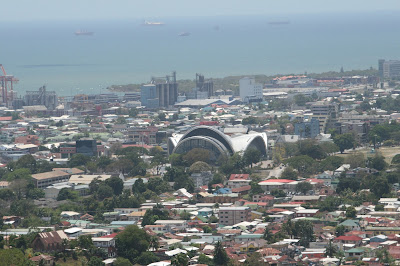Trinidad and Tobago's
present urban architectural designs reflect a range of combination from majestic
colonial buildings to modern and postmodern designs. The selected photos showcase
the beautiful aesthetic in keeping with engrafting older designs into
new buildings. This blog will educate some of the readers and stimulate their
minds on the beauty of hybridize cities. It also looks at ideas proposed by well-known
designer/architect Corbusier.
Definition of architecture.
- Architecture the art or practice of designing and constructing buildings: Oxford dictionary.
- Architecture is both the process and product of planing, designing and construction.
Colonial Urban Architecture
 |
| Holy Trinity Cathedral |
 |
| Old Administration building University of the West Indies St.Augustine |
 |
| Port of Spain light house |
These
images show colonial architecture buildings which are popular landmarks
of Port of Spain - Holy Trinity Cathedral, the Port of Spain lighthouse and the Old
Administrative building, University of the West Indies St. Augustine. Each adds
to Port of Spain’s unique skyline. The first time I saw these buildings, I was
marveled at their excellent architecture. I was especially astonished at the
Cathedral’s design because it reminded me of a cathedral
in Europe. I have been to several Caribbean islands and have
seen similar designs, but Holy Trinity Cathedral is quite unique in
its design.
During
colonialism, European nations spread their classic
and Gothic styles to the colonies and vice versa the
colonies designs spread to Europe. The spread increased the number of
replicated buildings designs in Caribbean cities. Owing to each city colonial
country, there are particular architectural styles that characterize each city.
For instance, Port of Spain’s buildings reflect its Spanish, French and British
history and many buildings reflect aspects of these colonial heritages. Although
some were modified over time, evidence of their tripartite heritage is
obvious and lends an idiosyncratic touch.
Corbusier
Corbusier was
a French architect from the 19th and 20th century. He developed two key visions
- the contemporary city (1922) and the radiant city
(1933). Through these designs, Corbusier found a solution to the
disorganized city. He wanted to
decongest cities by increasing their densities and increasing open spaces. He
argued for the demolition of existing
cities in order to rebuild on a clear sites and erecting modern high rise
buildings which used the latest building technology and had wide
boulevards to accommodate traffic (Hall and Barrett. 2011: 137).
His modernist design thinking was to decontextualize the city by starting
a city from a clean state without any sense of
history. His vision was realized after World War Two, when
some of Europe's historical city buildings were damaged or destroyed
and had to be razed for rebuilding. Corbusier’s architectural vision could
not work for the historical city of Port of Spain because of the projected
economic cost and the loss of culture. Port of Spain is unique city
and I am sure all Trinidadians and Tobagonians would prefer it to
remain that way.
Modern Architecture
The modern
architecture of Port of Spain ranges from weird, to simple, to beautiful; each has
a purpose and a place. Modern architecture, led to its widespread adoption for commercial development
and mass housing schemes using international styles. This may lead to
some claims that many urban landscapes are becoming very similar,
particularly in the commercial centers of cities, or 'placeless'(Relph
1987). This “placelessness” erases most of the idiosyncrasies of individual
cites as it reduces cities to carbon copies of each other.
Post Modern Architecture
 |
| Daaga Auditorium UWI St. Augustine Campus |
 |
| Bayside towers |
 |
| NAPA |
Postmodern
architecture is a growing movement used by architects to create and use past
styles and inspiration buildings. Communities, building and monuments
with postmodern designs have futuristic looks such as: lunar, animal
and plant shapes and a mixture of
Asian and European styles. The Bayside Towers is a residential
building which borrowed the idea of a ‘twin tower’ Corbusier style.
The National Academy of Performing Arts (NAPA) is another postmodern designs found in Port of Spain; it
was recently built and drew the attention of people as it is a copy of
the Sydney Opera House. Finally, a comparison of some of the
postmodern architectures from the globe with Port of Spain’s, reveals many similarities
but, over time the newer buildings change the look of the skyline and cause the
evolution of Port of Spain’s urban designs.
Reference
Relph,E (1987)The Modern Urban Landscape, Baltimore, MD John Hopkins University press.
Hall and Barrett(2011)Urban Geography, New York, Routledge.
No comments:
Post a Comment